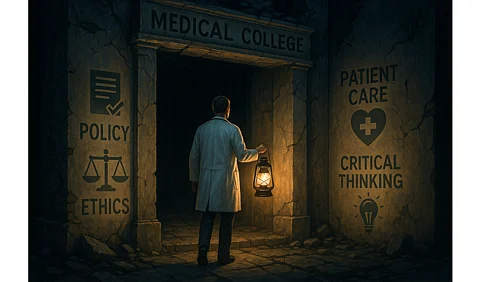Doctors need to lead Change in Healthcare, because they understand it better than anyone else.
Despite the many limitations of the current medical system, doctors remain the ones with the expertise and lived experience to truly understand what needs to change.
However, meaningful change can only be driven by doctors who are highly motivated, intellectually curious, ethically grounded, and professionally courageous. These are the doctors who can see through misinformation and resist being swayed by corporate or political agendas. They are emotionally resilient. And most importantly, they are not content with surviving the system, they are compelled to change it.
But for such doctors to emerge and lead, the transformation must begin at the root: our medical education system. If we want doctors who can challenge outdated systems and lead healthcare into a new era, we must empower them from the start.
Healthcare cannot be reformed from the outside in. It must be rebuilt from the inside out and it starts by rethinking how we educate the very people we trust to care for our lives.
Call to Action: Let’s Rebuild Medical Education that’s - intentional, relevant, holistic and safe.
● National career guidance system: Introduce aspirants to the realities of medicine and other abundant career options through a national career guidance system that students take before they finish school.
● Reimagining selection criteria: Selection criteria must be able to filter candidates based on passion and purpose. Take a page from other successful countries and organizations through holistic profile matching and interviews.
● Curriculum and Assessment Reform: Medical Education must be geared towards being more holistic with emphasis on preventive medicine, communication skills and infused with critical thinking modules and exposure to policy, systems thinking and relevant research. Curriculum must be intentionally strengthened to allow graduating doctors to be able to practice according to limitations but confidently.
● Assessment: Relying solely on the shift to MCQs to assess competency will not bring about the necessary change in how we evaluate medical professionals. A more holistic approach is required, one that tests not only clinical knowledge but also communication, research, and problem-solving skills. What’s crucial here is to enrich the educational system with faculty who are equipped to foster, develop and assess these skills. Without investing in educators who can guide students through these multifaceted dimensions of competency, the curriculum changes will not be enough.
● Safety Solutions and Culture Shifts: This is definitely a long process, I hope not too long. But we must strive patiently to facilitate culture shifts in medical colleges. To me, this starts from top to bottom. We must be able to promote this among medical education leaders, administration and then faculty. Then only can this trickle down to students and legacy thereafter. We must also ensure the safety of all medical professionals with zero tolerance for abuse. Investments must be made to have sustainable systems for monitoring, reporting and swift justice. I honestly do not have concrete solutions for this. Only hope and determination.
As I write this piece, I recognize that my analysis may have limited impact, and my proposed solutions may not seem comprehensive. But here's what I've learned through my own journey: change doesn't require perfection; it requires courage to begin. Every doctor who questions the status quo - they are all part of a movement that's quietly growing.
My message is simple yet vital: Empower doctors, and they will empower healthcare. Transform medical education, and healthcare transformation will follow.


